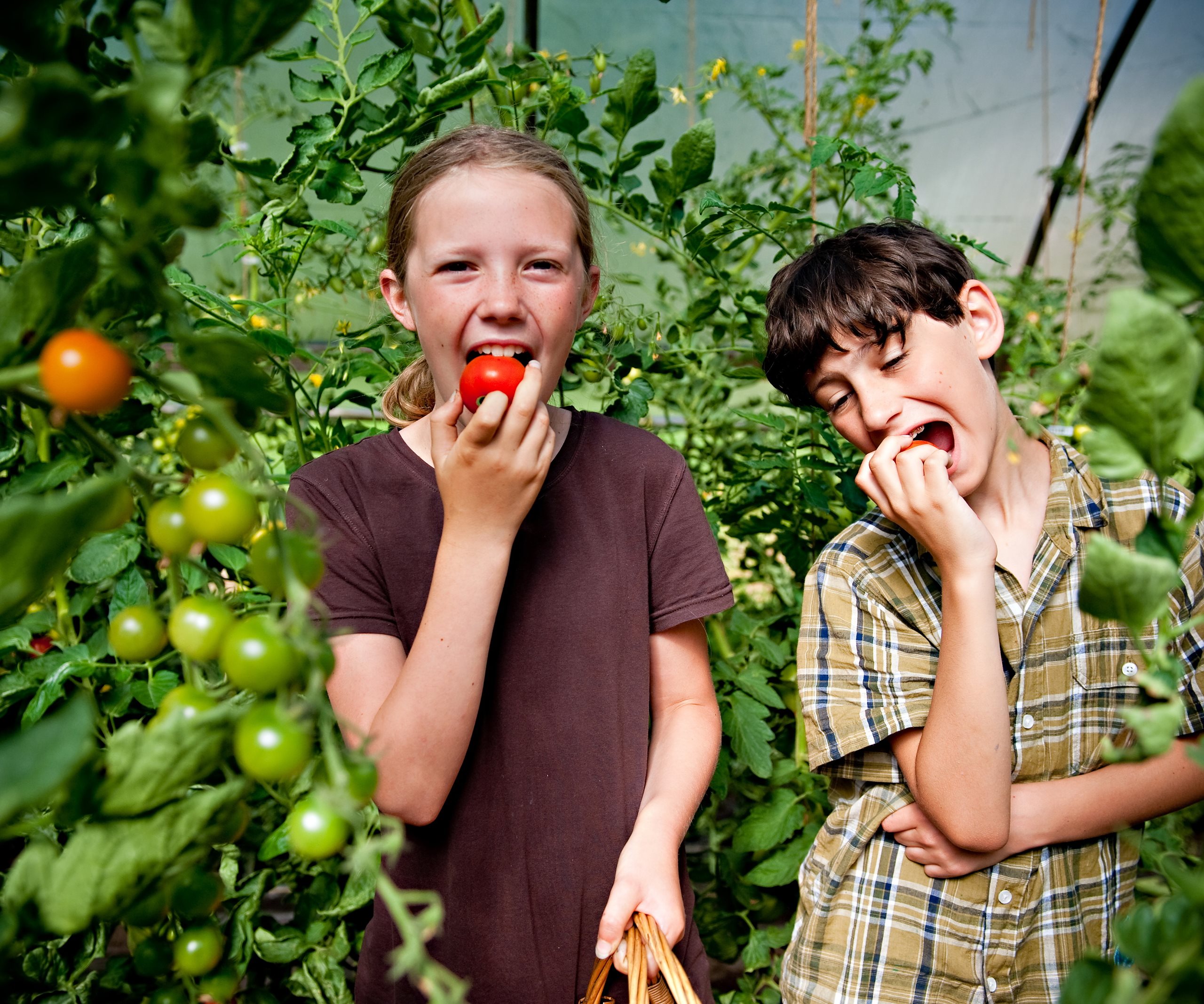A Deeply-Planted Faith
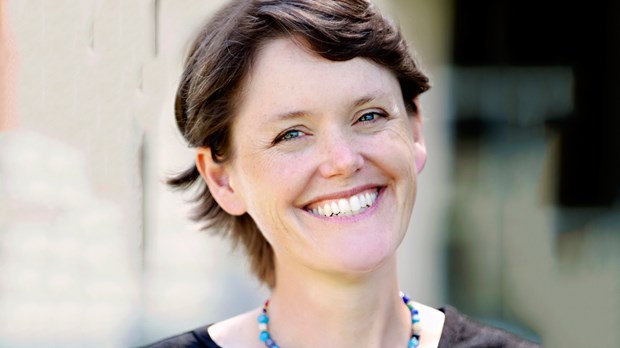
Leah Kostamo is passionate about caring for God's created world. A co-founder of Canada's branch of A Rocha, an international Christian conservation ministry, Leah and her husband Markku started Canada's first Christian environmental center, which focuses on environmental education and conservation work. It's also home to an organic CSA-farm that feeds about 100 families and provides nourishment for those in poverty.
Leah's book Planted: A Story of Creation, Calling, and Community describes her family's journey into conservation work and makes a compelling case for why we, too, are called to steward God's created world. In honor of Earth Day, TCW regular contributor Kelli B. Trujillo spoke with Leah about environmental stewardship and its connection to our Christian faith.
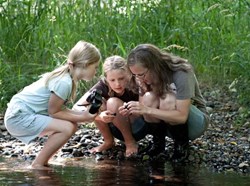
Leah's kids, Maya and Bryn, and A Rocha's intern Audrey explore the wonder of a river.
How did your passion for God's created world begin?
Though I live in Canada now, I'm from the States. I grew up in Arizona, but during my childhood summers, my parents took us up to Orcas Island, an island off the coast of Washington.
Ecologist Rachel Carson once said, "If a child is to keep alive his inborn sense of wonder . . . he needs the companionship of at least one adult who can share it, rediscovering with him the joy, excitement, and mystery of the world we live in." For me, Orcas Island was a special place of wonder. Our neighbors there, a biologist and an ornithologist, took my family on daily adventures. They had handmade canoes and kayaks they would take us out in; they took us on hikes and taught us the names of plants. Together, we worked in their huge organic garden.
For me, the love of creation was already there. Those childhood summers on Orcas Island, learning with our neighbors and spending every day outside, served to foster and ground this blooming passion.
How does your faith inform your environmental concern? And what do you see as some of the key ideas that uniquely shape a Christian approach to environmental issues?
We often approach the world in a very anthropocentric way, as if we humans are the center of everything and we own everything. This mindset can lead people to look at the world primarily as a resource instead of as God's creation. The organization we work with, A Rocha, takes its inspiration from Psalm 24:1: "The earth is the LORD's, and everything in it." This completely flips anthropocentrism on its head. Nothing really belongs to us—everything we see belongs to God.
When you start from this vantage point, taking care of our world is a way of proclaiming Christ's lordship over everything. It's proclaiming that this all belongs to him and our service in taking care of it is an act of obedience and stewardship. For the Christian, this is certainly not about worshiping the Earth. It's about worshiping God. Our stewardship is a form of worship.
In Planted, you highlight the importance of understanding the interconnectedness—both biological and theological—of creation. Why is this so critical?
Sin doesn't only fracture our relationship with God and with people; it also fractures our relationship with creation. Hosea 4:1–3 describes the effects of sinful behavior. Not only does our sinfulness lead to human death and adultery, but Hosea also comments on the death of animals: "The beasts of the field and the birds of the air and the fish of the sea are dying" (NIV). That passage directly links the death of creatures and species to human sin. Not only does our sin affect our personal relationship with God, but it also affects other people and creation.
Sometimes I feel like the negative effects of human-caused environmental degradation are so discouraging that it's hard to be hopeful. Yet inPlanted you affirm hope as a critical component of Christian environmental stewardship.
I find motivation in the truth that God is working toward the redemption of all things. Some tend to think that just people are redeemed, but says that God is reconciling "to himself all things." We can assume that "all things" actually means all things. God is working for the redemption of all that he has made.
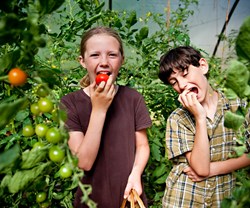
Leah's daughter, Maya, and her friend Isaac enjoy eating tomatoes straight from the vine.
I understand that feeling of discouragement. I also feel paralyzed when things get hard—sometimes I want to stick my head in the sand and wait for it all to pass.
But Christian hope isn't just a pie-in-the-sky, someday-things-will-get-better stagnant hope. Real hope moves us toward action. Even when our hope and our actions appear small, we are participating with a God who is all about the work of redemption.
To move from ideas into action, it needs to become personal, doesn't it? It needs to matter to us.
We don't care about things we don't love, and we don't love what we don't know. If we're always in our cars—not outside, not being still, not observing—then we don't even notice the birds. Eventually, everything just becomes anonymous.
Instead, we can go outside and learn the names of things. When I'm outside with my kids we try to make a habit of pointing out the names of creatures, like "Oh, that's a junco," or "That's a varied thrush." When they know these creatures by name, I think they're more apt to want to care for them.
So the first thing in moving toward hope is the theology that everything belongs to God. This good grounding allows us to participate with God in the reconciliation of all things to Christ. But then we have to move toward knowing creation. Get to know the names of trees and birds in your neighborhood. And from here we can move toward doing things—even simple things—that make a difference.
What are some examples of these simple, hopeful actions we can do to care for God's creation?
The two biggest impacts we have on the environment have to do with what we eat and how we travel. We can start by paying attention to these issues and making intentional decisions, like choosing not to eat feedlot beef because of the huge impacts industrial farming has on the environment; or we could choose to eat more locally, more seasonally; or a family could purposefully choose to spend a holiday close to home. It's a matter of making practical choices that put feet on our beliefs. It's an outworking of our hope.
Women, especially, have a lot of power here because women are often the ones making these types of decisions for their household. Women often shape what and how a family eats or where their family goes on holidays. Because the rhythms of family life are often significantly influenced by women, we can purposefully shape the culture of our homes, making them more care-full for God's creation.
Read more articles that highlight writing by Christian women at ChristianityToday.com/Women
 Read These Next
Read These Next
 Mission of MercyHow three homeschool moms and a nurse made an impact on Katrina victims.
Mission of MercyHow three homeschool moms and a nurse made an impact on Katrina victims.
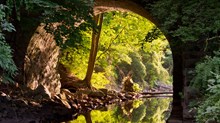 Seeing Our Parents HomeThe painful privilege of caring for aging and dying parents
Seeing Our Parents HomeThe painful privilege of caring for aging and dying parents








 Homepage
Homepage
